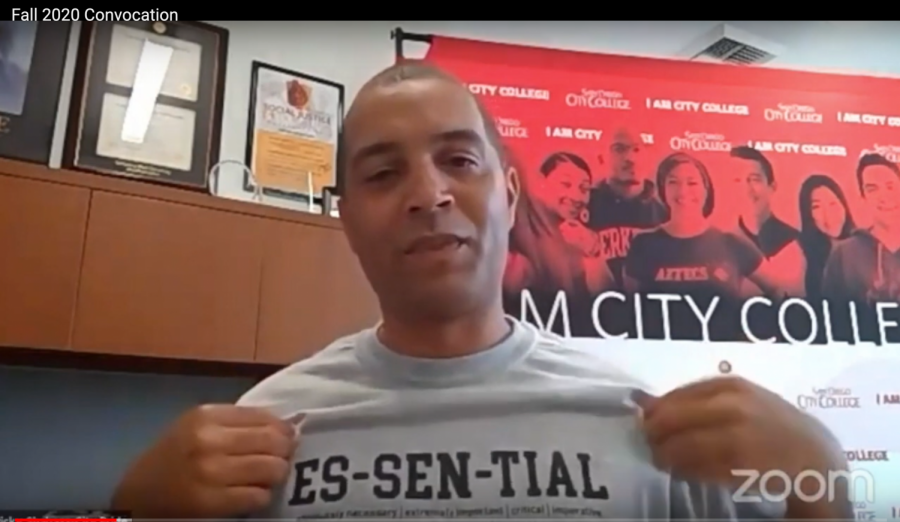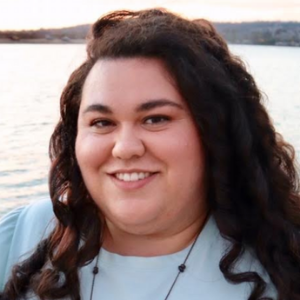City College convocation offers view of what to expect through pandemic
President Ricky Shabazz, Chancellor Constance Carroll share updates in dressed-down virtual ceremony
President Ricky Shabazz is wearing an “Es-sen-tial” t-shirt during City College’s virtual convocation. // YouTube screenshot
August 31, 2020
In the past, City College’s convocation typically involved a formal engagement with a large group of people physically gathered inside the expansive Seville Theatre.
This year, due to the ongoing COVID-19 pandemic, the annual opener looked very different.
Instead of seeing President Ricky Shabazz in a suit and tie speaking on a stage behind a podium, students, faculty, staff, and administrators tuned in online and were met with a screen of neatly arranged boxes displaying the familiar faces of campus leaders on August 14.
Among the boxes was Shabazz, sitting at his desk wearing a t-shirt with the word “Es-sen-tial” across the front.
“First time I got to do a convocation in a t-shirt,” said Shabazz at the start of his virtual presentation. “I mean you know, this is our new normal. I haven’t worn a collared shirt probably in four months because we are working to keep things moving forward in this pandemic.”
“Es-sen-tial” shirts were a project headed by acting Vice President of Administrative Services Roxann Solis as a way of acknowledging the essential workers who have remained on-campus throughout the pandemic.
Others joining Shabazz in wearing the t-shirts on camera were Academic Senate President Paul Alexander, Classified Senate President Awana Payne and briefly on screen wearing both the shirt and a face mask was Public Information Officer Cesar Gumapas.
A common theme from campus leaders was the appreciation, gratitude, and commitment to students and employees as the college and the San Diego Community College District move collectively through the pandemic.
This theme also permeated the preceding convocation livestream led by the SDCCD Chancellor Constance Carroll.
“We are change agents of a significant nature affecting student lives … what you do with our students matters,” said Carroll, as she addressed faculty, classified professionals and administrators directly.
The chancellor was concerned about challenges that have come up due to COVID-19. She laid out a five point plan of initiatives she hopes to resolve this upcoming school year, her last before retiring:
- Committing to safety and health policies while maintaining continuity of operations throughout the district, including distance learning, protecting essential workers, and providing as many services and resources as possible remotely.
- Cutting $17 million in spending from the district budget as California grapples with a deficit of over $54 billion.
- Managing enrollment and offering more eight-week courses as popularity for shorter terms rises. She also acknowledged the need for in-person classes, but added that everyone should plan to continue with remote learning for the spring semester.
- Protecting and supporting students of the Deferred Action for Childhood Arrivals program, the LGBTQ community and reviewing district college policing practices. Miramar College plans to review the curriculum of its police academy.
- Working with legislators to extend the baccalaureate option, which so far has been successful in giving bachelor’s degrees at Mesa College. She also added securing federal money to balance the deficit to retirement programs is a priority, as well as pushing to change how funds are distributed by the state based on student enrollment versus positive attendance.
Shabazz shared successes that have come out of the last several months of sheltering in place.
The college received $2.5 million from the Coronavirus Aid Relief, and Economic Security Act and community partners, $30,000 of which was specifically allocated for undocumented students.
And as the academic year progresses, Shabazz said he will focus on ensuring continuity and expansion of mental health and Disability Support Programs.
He also mentioned investing $30,000 into the college sustainable agriculture program.
“We know the college has needs as well,” he said. “There’s been a lot of discussion about the institutional portion of CARES and we have very real challenges as a result of the COVID matter, and we know we have employees who need access to computers and WiFi and technology.
”We know … there are hard-to-convert classes that need labs and connectivity. And so you see a high level overview of how we are going to use the $1.65 million of institutional CARES funds (from the federal government).”
While the pandemic has forced everyone to adapt and reflect, so has the conversation surrounding social justice. Anti-racism and an urge toward the proliferation of authentic ethnic studies were the central tenets spoken of by the guest speaker of convocation, Dr. Melina Abdullah.
The Cal State LA Pan-African Studies professor, activist, and founder of the Los Angeles chapter of the Black Lives Matter Movement explained the fundamentals of Naomi Klein’s Shock Doctrine. She made an appeal for correcting the historical narrative that has been inaccurately portrayed by the established authorities.
She also explained the importance of creating a learning culture that takes into account student experience, and in doing so, creating more connection and open dialogue.
“Institutions and systems are cold,” Abdullah said. “This is an opportunity to counter their coldness with love, care and familial relationships.”
Christina Painton is also Executive Producer for Newscene, San Diego City College’s broadcast news program. Check out the latest episode on YouTube, @sdcitynewscene.













